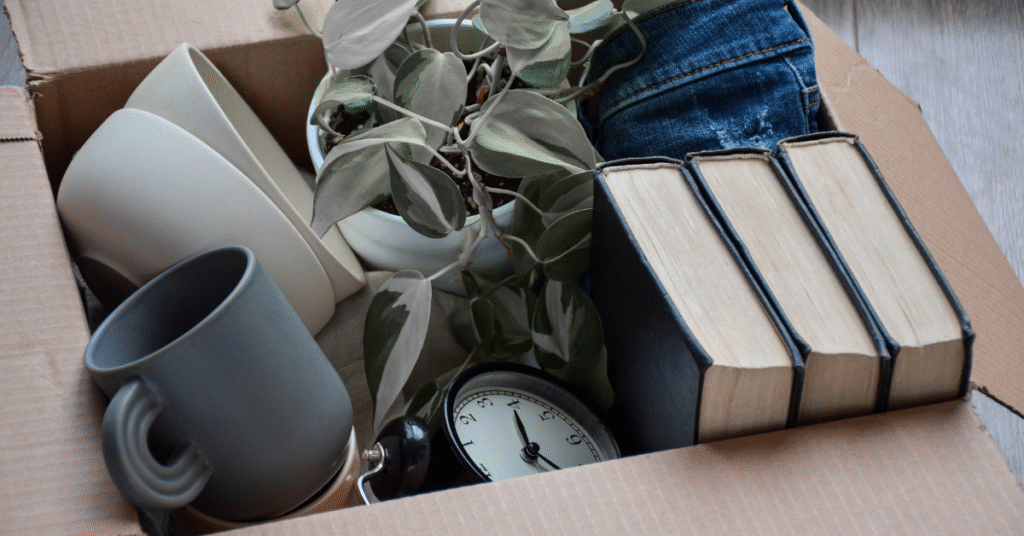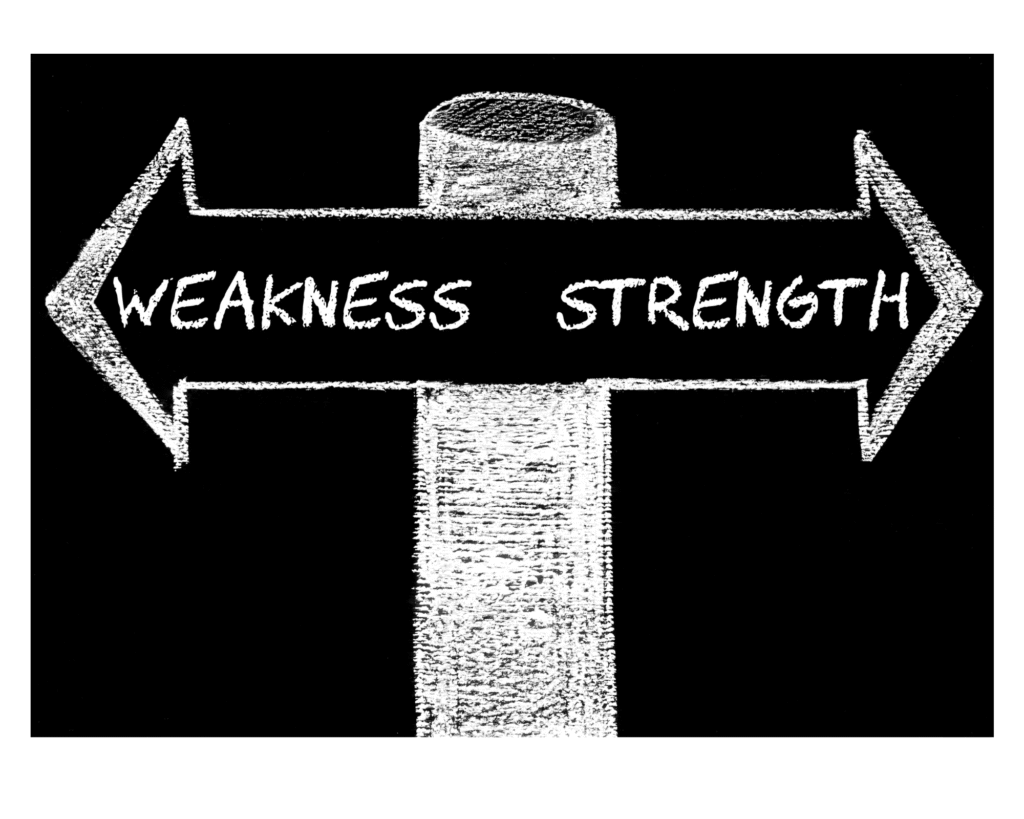We didn’t all arrive on this amazing earth wired the same way. Even if you were raised in the same household, by the same parents, or grew up sharing a bedroom your natural tendencies, personality, and way of navigating the world are uniquely yours.
Take my sister and me, for example. I was never asked to organize my books or my knick-knacks as a child (yes that’s what I called them, those little treasures I adored and displayed proudly). Meanwhile, no one told my sister to cover her bed in a blanket of Smurfs. But she did. That was her joy, her personality shining through. We grew up in the same home, yet we each carved out space in our world differently. And that’s the beauty of it.
Different Wiring, Same Chaos
We all have different strengths and weaknesses. And interestingly enough, sometimes our strengths, when overused, can become weaknesses.
What … that is mind blowing.
How are our weaknesses just our strengths overused? Pretty much all of our weaknesses are just our strengths overused or not managed correctly. For example, planning can be very useful and help live a certain kind of life. But if we overuse that strength then we may not be able to be flexible. We may not be able to navigate or handle changes or unexpected things or impulsive, spontaneous things that weren’t planned. They can become a challenge if we overuse that planning strength.
One of my strengths is keeping a clean and organized home. Sounds great, right? And it is until it isn’t. Sometimes, my desire for order gets in the way of being fully present with my grandbabies. I’ll find myself worrying more about the mess than enjoying the moment. But in those moments, I have to remind myself, what brings true calm isn’t a spotless house it’s a heart full of joy. A home can be clean and organized, and it can be filled with love, laughter, and even a little mess.
Clutter Is Just a Delayed Decision
If decluttering feels hard for you, it might be because you have a hard time making decisions. The inner dialogue sounds something like:
“What if I need it later?”
“What if I miss it?”
“What if someone else wants it?”
Making decisions especially around stuff can feel hard. But here’s the thing: most of the time, we aren’t deciding between keep or toss. We’re wrestling with guilt, fear, and attachment.
If making a decision around decluttering is hard start with something simple, like … wooden spoons.
How many do you really need? Be honest. If you’re like me, you probably have two favorite ones you reach for every time. What about the other ones, they take up space in your drawer and in your mind. Keep the ones you use all the time and donate the rest.
This blog post gives you 10 steps to declutter your home.
The 20/20 Rule That Changed Everything
Awhile ago I heard a rule on the radio from The Minimalists, I don’t know much about them, I’m not even sure where I heard them, but I’m glad I did because this rule stuck with me:
The 20/20 Rule: If you’re afraid to let something go because you might need it later, something you haven’t used in awhile, ask yourself:
Can it be replaced in 20 minutes for under $20?
If the answer is yes, consider letting it go. Don’t take this rule literally, but rather as a mindset shift. Most of us live just a few minutes from stores stocked with everything we need and more. And let’s not forget, we can have nearly anything delivered to our doorstep in under two hours these days.
If you’ve got a drawer stuffed with wooden spoons or any other item you don’t use or have too many of. It is ok to let them go because if there comes a time where you need more, you can replace them quickly and easily. I don’t know if I’ve ever replaced something I’ve donated. So don’t think you will be replacing items over and over and over again.
Declutter with Intention, Not Hesitation
Seasonal items? Keep them if you love and use them. But don’t hold on to things just because you might want them someday. Be honest.
Do you really need:
All the insulated tumblers
Cake pans and cookie sheets
That sandwich press you haven’t touched in two years?
If you use it, keep it but be intentional about your decisions. If not, bless someone else by giving it back to the world.
Go into the kitchen and see if you can find 5 items you can let go of.
Maybe it’s a mixing bowl you never use, mismatched lids, or a juicer you keep thinking you’ll use but don’t.
Keep the things you actually use and let go of the “just in case” clutter.
Sentimental Clutter: What to Keep
Now, let’s talk about the hardest stuff to sort through, sentimental items.
When someone we love passes away or a meaningful chapter of life ends, we often keep everything. And in the beginning, that’s okay. There’s no need to rush the process. Time plays a huge role in making peace with letting go.
But at some point, those boxes of keepsakes hidden in closets, garages, or attics become out of sight, out of mind. If you can’t remember what’s in the box, or when you last opened it, it’s time to take a look.
Keeping something does not equal love. You can love your child without keeping every crayon drawing. You can honor your marriage without holding on to every card your husband ever gave you. You can cherish your late parents without keeping every item they once owned.
If you love it, display it.
If it brings peace, keep it.
If it feels like a burden, let it go.
Make It a Process, Not a One-Time Project
Sentimental editing isn’t one-and-done. My husband and I each have a box of things from our childhoods. Every couple of years, I go through it. Not every time, but sometimes, something in there no longer brings the warmth it once did. I realize: it’s no longer a keepsake, it’s just stuff.
As I age, I think more about what I’m leaving behind for my children. Would my son want me to keep this? Or is it just one more thing he’ll have to deal with?
Here’s what I’ve started doing, and what I recommend you do too:
Label boxes clearly
Write a note explaining what the item is and why it matters
Give your loved ones permission to let go when the time comes
Give Yourself and Your Family the Gift of Space
The last thing I want to do is burden my sons with boxes of unlabeled items that don’t mean much to them. I want to give them the gift of space. Of freedom. Of clarity.
If you’ve inherited boxes of your parents’ belongings, set a small, manageable goal:
Go through one box. Let go of five items. Or whatever number feels doable. Take your time. Breathe.
Will you occasionally let go of something and wish later that you hadn’t? Possibly. But usually, that moment passes quickly. Because in the end, stuff doesn’t equal love. You don’t need your great-grandma’s teddy bear to remember her love.
Start Small. Choose Intentionally. Create Calm.
Don’t try to tackle your whole home in one weekend. That’s a recipe for burnout. Start small.
One drawer
One box
One shelf
Let this be a journey of creating space not just in your home, but in your life. Every item you let go of gives you a little more room to breathe. A little more clarity. A little more calm.
You’re not just organizing stuff you’re cultivating a home and life that supports who you are today and who you’re becoming.
So go ahead choose calm over clutter. Choose love over guilt. Choose intentional living over “just in case” storage.
And remember, you don’t have to do it perfectly you just have to take the next small step.
You will love this Declutter and Edit Guide. It’s FREE. Get it Here.







